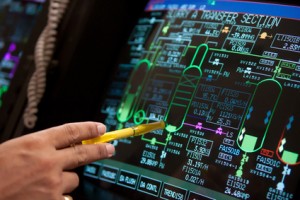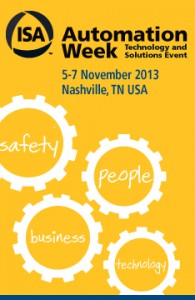This recurring blog covers news about ISA Automation Week: Technology and Solutions Event from the unique viewpoint of the event’s project manager, Carol Schafer. With a technical background to draw on, a penchant for humor and the inside track on conference updates, Carol informs and entertains with messages that are always illuminating and often downright funny.
Everybody’s talking about the lack of qualified automation professionals – “autopros” as I have referred to these fine folks in previous blogs – to meet the needs of process manufacturers starving for employees. Everybody’s talking about it, but some are doing something about it. Here at ISA, we do both. Talking is my forte (ask around), and every good idea necessarily starts with talking. But putting programs and resources in place to increase the numbers of engineers and  technicians coming into the workforce takes some doing. If you’re entering the workforce, or you are already an autopro (love that word), you’re either being groomed to join us (resistance is futile), or you may be helping someone else prepare to join us. To maintain profitability, quality, and the sustainability of process manufacturers, we all need to pitch in.
technicians coming into the workforce takes some doing. If you’re entering the workforce, or you are already an autopro (love that word), you’re either being groomed to join us (resistance is futile), or you may be helping someone else prepare to join us. To maintain profitability, quality, and the sustainability of process manufacturers, we all need to pitch in.
ISA, as the professional society for autopros, is very involved in getting students interested in manufacturing and engineering careers, and in helping provide the necessary mentors to assist those entering the industrial workforce increase their relevancy, expertise, and knowledge earlier than they could otherwise.
What does this have to do with you? I’ll give you three answers to this question toward the bottom of this blog. But don’t skip down there now, or they won’t make any sense. (Yes, they will, I just want you to read the whole article so you don’t miss any of the great stuff in the middle.)
So what does one need to know, or be prepared for, upon entering the automation profession? Sure, you need technical knowledge and you can get some of that in school, but here’s my personal take on the subject – not to be confused with actual advice or counsel:
- Accept that none of your friends will “get” what you do – even if you explain it.
When I had to tell people I sold “instruments” or worked in instrumentation and controls, they would usually ask “Like…guitars and stuff?” “Uh…nnooo…never mind.” I mean, you can try to explain… “So, listen, what I do is I tune the control loop which has to be done with instruments that have to be calibrated to within the right tolerance, and then we watch the batch recipe and we watch the EPA emissions because the stack has to be within a certain percentage of the...” By now, you pals are staring into space or are already off talking to someone else anyway. My advice? Just tell them “It’s an autopro thing – you wouldn’t understand.” Then be secretly excited that you are an insider in a profession so cool that it defies explanation! - No education program will prepare you for entering your first automation and controls job – and much of what you learn will never be used.
I’m not saying you don’t need college or a degree. College is useful for a variety of things…but I digress. Once you’re out of school and into your first automation job, you’ll find yourself relying on mentors and co-workers who are willing to share their intimate knowledge of the plant’s processes with you. When the flow rate won’t stabilize, you won’t be able to “Google it” because installations are all unique. You’ll need someone to let you in on the particulars of the system, its history, upgrades, and peculiarities – even its personality. If you don’t think control systems can have personalities, consider Hal 9000 from 2001: A Space Odyssey. Somebody’s got to get control of these systems – save humanity! - Realize that – fresh out of school – you still won’t have enough training.
You’ll need specialized training from your employer – and perhaps additional training from an organization like ISA in order to avoid the common mistakes made by engineers leaving school with a head full of calculus that they’ll likely never be asked to use on the job. - Be prepared to find out that the breadth and types of knowledge you need is vast – and can’t be obtained overnight. Figure out early how to align yourself with others – such as fellow members in a professional society like ISA – who can help you grow and learn. Ask them what training they have taken and what they recommend. Ask them how membership in a professional society has helped them learn and grow in their profession so that they move forward and feel enthused, in control (no pun intended) and not just another pretty face around the control panel.
- You will belong. If you are an individual thinker, a thoughtful problem-solver, a deductive, reasoned person, you belong here. If, like me, you were the one to take apart electronic devices around the house and “fix” them when you were a kid – you’re going to love this profession. And you’ll be around others who “understand” you. Speaking from a lifetime spent around engineers, technicians and autopros – it’s an addictive, and exciting career choice.
There are lots of ways to participate and to belong. Check this out:
The ISA Mentor Program can be a key to your success or a platform for you to share what you know. For students in the ISA Mentor Program during 2011, ISA Automation Week 2012 was a game-changer. Their expectations about the conference were dramatically changed when they realized they were going to learn from and network with the best in the business. Greg McMillan, respected autopro, author, and expert in the field is a key mentor in this program, along with Hunter Vegas and other volunteers who give of themselves for the next generation. NOTE: Greg McMillan will host a tutorial on the ISA Mentor Program within the Industrial Automation & Controls education track at ISA Automation Week 2013. Come and meet Greg and see how the program has impacted its mentees over the past two years
 ISA student memberships are available. They are cheap ($10 – can you believe that?) and we work hard to integrate them into the automation community. We’ll talk about student sections, how you can get involved, what their value is to the business and to the technical side of automation at ISA Automation Week as well.
ISA student memberships are available. They are cheap ($10 – can you believe that?) and we work hard to integrate them into the automation community. We’ll talk about student sections, how you can get involved, what their value is to the business and to the technical side of automation at ISA Automation Week as well.
By now, I bet you just can’t wait to get to Nashville and the ISA Automation Week 2013 conference. I can’t either. Let’s meet in Nashville. Let’s get this thing rolling, and learn how to help take responsibility for the sustainability of our industrial workforce. It’s going to help us, and it’s going to help the industry (whichever category you fall in, let's reverse the shortage of qualified automation professionals.)
 About the Author
About the Author
Carol M. Schafer has more than 35 years of experience in the industrial automation and control field as a technical sales and marketing professional. She spent 14 years in the field as principal of a manufacturer’s representative company, selling flow and humidity products, air and gas analyzers, CEM equipment, and sampling systems. She also worked for several years as the East Coast sales manager for a leading weather instrument/systems manufacturer. Carol joined ISA in 1996, and is currently project manager for the Society’s annual conference, ISA Automation Week. She also serves as a senior consultant with the ISA Corporate Partnerships Program. She obtained a bachelor's degree in business administration from the California State University at Sacramento, and a master’s degree in business administration from San Jose State University.



